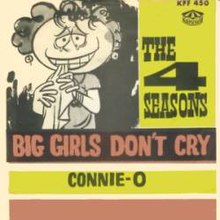Big Girls Don't Cry (The Four Seasons song)
| "Big Girls Don't Cry" | ||||
|---|---|---|---|---|
 |
||||
| Single by The Four Seasons | ||||
| from the album Sherry & 11 Others | ||||
| B-side | "Connie-O" (non-LP track later included on Golden Hits of the 4 Seasons album) | |||
| Released | October 1962 | |||
| Format | 7" single | |||
| Recorded | September 1962 | |||
| Genre | Rock, doo-wop | |||
| Length | 2:26 | |||
| Label | Vee-Jay | |||
| Writer(s) | Bob Crewe, Bob Gaudio | |||
| Producer(s) | Bob Crewe | |||
| The Four Seasons singles chronology | ||||
|
||||
"Big Girls Don't Cry" is a song written by Bob Crewe and Bob Gaudio and originally recorded by The Four Seasons. It hit number one on the Billboard Hot 100 on November 17, 1962, and, like its predecessor "Sherry," spent five weeks in the top position. The song also made it to number one, for three weeks, on Billboard's Rhythm and Blues survey.
According to Gaudio, he was dozing off while watching the John Payne/Rhonda Fleming/Ronald Reagan movie Tennessee's Partner (1955) when he heard Payne's character slap Fleming in the face. After the slap, Fleming's character replied, "Big girls don't cry." Gaudio wrote the line on a scrap of paper, fell asleep, and wrote the song the next morning.
However, the now-famous line does not appear in the Ronald Reagan film. According to Bob Crewe, he himself was dozing off in his Manhattan home with the television on when he awoke to see John Payne manhandling Rhonda Fleming in Slightly Scarlet, a 1956 film noir based on a James M. Cain story. The line is heard in that film.
Like "Sherry," the lead in "Big Girls Don't Cry" is sung mostly in falsetto. With this song, the Four Seasons became the first rock-era act to hit the top spot on the Hot 100 with their first two chart entries (their first single, "Bermuda"/"Spanish Lace," did not appear on any Billboard chart in 1961).
Various episodes of Happy Days feature this song, most notably when it is played in the jukebox at Arnold's diner. It was also used, with customized lyrics sung by the Four Seasons themselves, as the theme song to Joey Reynolds's various radio programs throughout the United States.
...
Wikipedia
